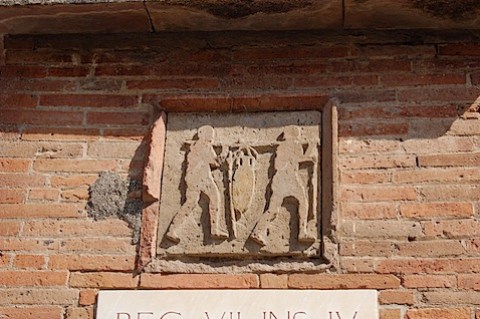Regular readers of this blog will know that I have a thing about ragu, as described here, here, here, here and most recently here.
One of the great things about dishes like ragu with pasta is that there’s so much scope for experimentation.
You can vary the pasta in use: the traditional spaghetti, the more recent penne, the gramigna that the people in Bologna swear by, the paccheri that the Neapolitans used to smuggle garlic, any of thousands of varieties of pasta.
In fact you don’t even have to use pasta.
You can vary the meat. Some swear by pork, some by lamb, some by beef. Some mix pork and lamb. In Sorrento I was served buffalo. Those in the know in Bologna said that the best thing to do is to use salsiccia, a local sausage. But you know what? Even they would say it’s up to you.
Up to you. That’s the beauty of cooking. Someone makes a recipe up. Someone else uses a recipe that’s been in her family for generations. Someone else uses a cookery book. Or even the Web (I’m a regular user of epicurious).
You can use a recipe, but you don’t have to follow it.
It used to be said that human beings go through three stages of development: dependence (as in parent-child); independence (as in adolescent); then interdependence (as in grown-up). These stages are also visible in organisations as they develop: how business units have a dependent relationship on the centre, then flex their muscles as they grow, finally coming to a mutually respectful and valuable relationship over time.
So it is with cooking. I remember a time when the only way I could cook was to follow a recipe parrot-fashion. Then came a time when I wanted to do my own thing, experiment with abandon. Now I read recipes and change them as I want or need: sometimes I have to vary ingredients because one of the guests has a medical condition, known allergic reaction or low tolerance for some critical component of a dish.

What’s all this got to do with Cory Doctorow? Simple. This post is a review of his latest book, Makers, which you can read “serially” for free over here at Tor, or pre-order here.
I’ve been fascinated by the concept of open multisided markets for many years now. How innovation flourishes, how business flourishes, how people flourish and how society as a whole gains from using open models for business. [If you want to learn more about open multisided markets, try reading Paying With Plastic or Invisible Engines, two excellent books on the subject; David Evans and Richard Schmalensee know their stuff and tell it well.]
Cory has done once again what he does so well: he has created a world where we can learn about the rich possibilities ahead of us in terms of cultural development, yet one which is fraught with risks because of the incredibly stupid things we can do. If we let ourselves.
I don’t want to spoil the book, so I’m going to say nothing whatsoever about the plot. What I am going to say is this:
Our world is full of franchise-based models, where people make money by doing something formulaic and controlling input ingredients, manufacturing process and output quality. In itself there is nothing wrong with a franchise model.
But you know something? I can make myself a hamburger or pizza any way I want. I don’t have to go to a particular franchise operator, or buy their ingredients, or use their recipes, or work their processes. I can if I want to. I don’t have to.
Imagine a world where someone managed somehow to patent the burger or the pizza, where it was no longer possible to make your own. You had to use someone else’s systems, their processes, their ingredients.
In a physical world this is hard to imagine, or, for that matter, to implement and police.
In a digital world it is a different matter altogether. We can police it. We can implement systems that force people to use particular systems, particular processes, particular ingredients. We can create artificial monopolies. And suffer the consequences.
I have always maintained that every artificial scarcity will be met with an equal and opposite artificial abundance; that’s why region coding on a DVD is an abject failure, why the music industry moved away from DRM, why we have to find new and pragmatic models for making sure creators and distributors of “content” are appropriately rewarded. [I’ve been visibly influenced by much that Cory has written in this respect; I’d also recommend the works of people like Larry Lessig, Terry Fisher, Jonathan Zittrain, the Berkman Center in general (with the mercurial Charlie Nesson). Rishab Aiyer Ghosh and the people at First Monday are also well worth a visit.]
There are many reasons to avoid creating new monopolies, not all of them pinko tree-hugger in origin. We are learning every day about the value of diversity in genes (I was lucky enough to hear Cary Fowler speak on the subject recently: if you’re interested, take a look at The Threatened Gene, even though it was written nearly two decades ago.)
Gene diversity gives us options for the future, options for conditions and scenarios we haven’t faced, don’t face but could face in the future. What is true for plants is in its own way true for cultures, for the way we think and act, for what we believe.
And there’s something far more important at stake here, how we as human beings learn and develop and create and experience things. What Pat Kane builds out so majestically for in The Play Ethic. What Dan Bricklin expounds so masterfully in his essays on tools in Bricklin on Technology.
As a founder of the Electronic Frontier Foundation, Cory knows a thing or two about the world we’re entering. The wonderful possibilities ahead of us. The potential for awful waste. The social, economic and political consequences of getting it right. Or wrong.
Makers is a book about that future. A book that brings together open multisided platforms, opensource and democratised innovation, distributed “edge-based” production, customer-driven demand creation, customer-participated supply.
Makers is a book that brings that future into shape in front of us, allows us to visualise the models that would make it work. Or break it. The implications for patents, for intellectual property rights in general. The role of money and credit and payments and micropayments. The rule of law; and where the law could be an ass.
Makers is a book which lets us get into the heads of the born digital, the grown up digital, the way they think about things. What their values are. Why we should take a leaf out of Larry Lessig’s Remix and make sure we don’t criminalise a whole generation by our lack of understanding.
Go ahead and read the book. Electronically. Or physically.
Go ahead and pay for it. Or not, as the case may be.
It’s your future. And mine. And ours. And those of our children. And a rattling good read as well.
Like this:
Like Loading...

















